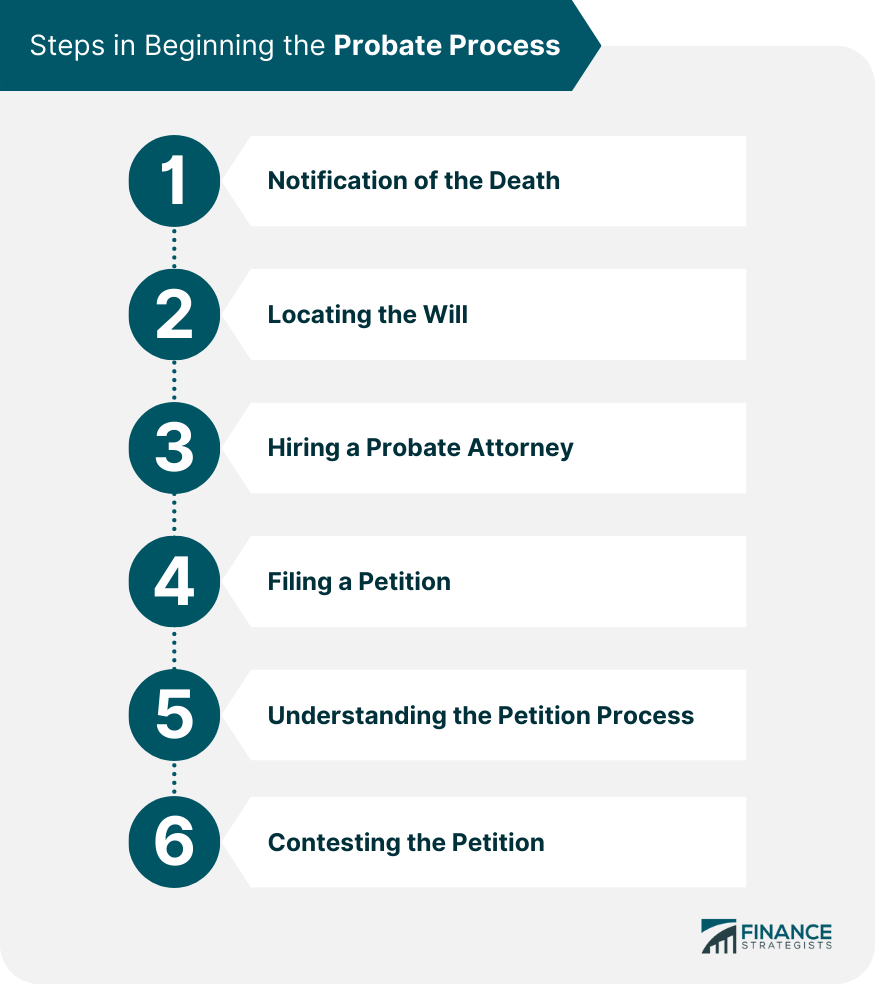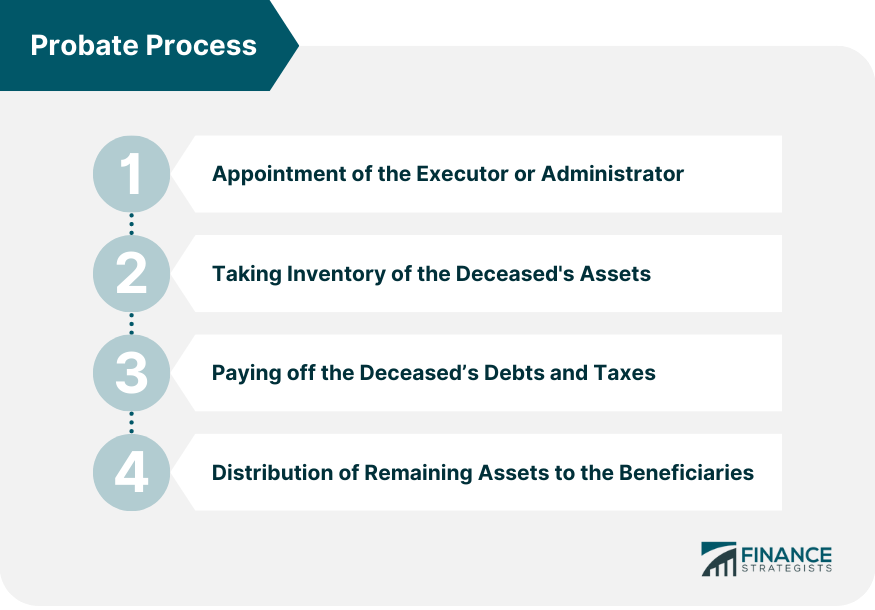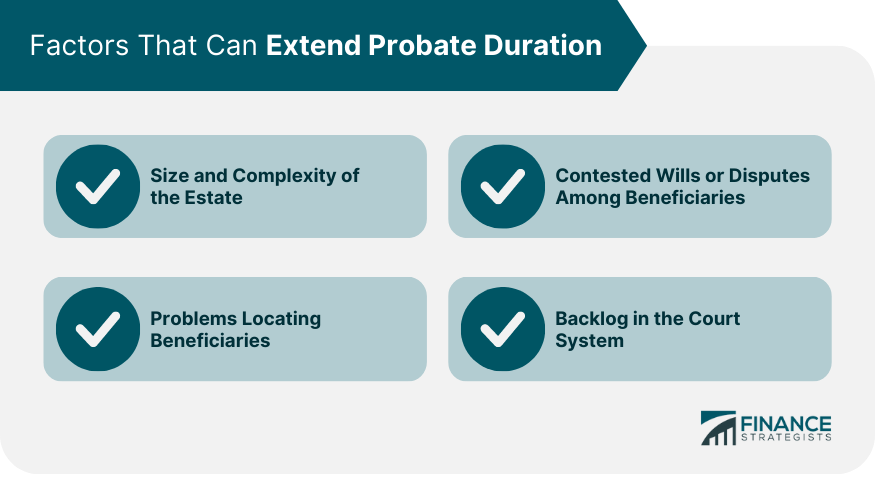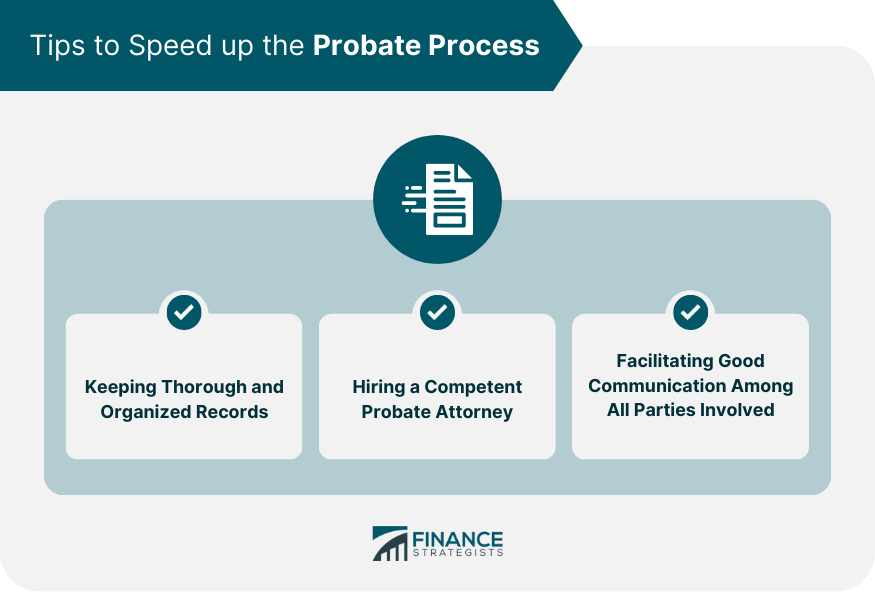Probate duration can greatly vary, generally lasting from a few months to over a year, or even longer in complex cases. It depends on factors like the complexity of the estate, tax issues, whether the will is contested, and the efficiency of the probate court. On average, the process takes about 1 to 2 years. This includes validating the will, appointing an executor, inventorying the estate's assets, paying off debts and taxes, and distributing the remaining assets to the named beneficiaries. Remember that laws governing probate can differ between jurisdictions, so consult with a legal professional in your specific location for a more accurate timeline. The first step after a death is notifying relevant parties. This includes immediate family, friends, and the deceased's employer. Financial institutions, government agencies, and insurance companies should also be informed. The next step is locating the will, if one exists. This document provides the decedent's wishes regarding their estate's distribution and names the executor responsible for managing the probate process. Depending on the complexity of the estate, it might be necessary to hire a probate attorney. These legal professionals can provide invaluable guidance, handle paperwork, and offer advice on difficult probate issues. The probate process officially starts when the executor or administrator files a petition with the probate court. This petition seeks legal recognition of the executorship and the validity of the will. If a beneficiary or other interested party contests the will, it can lead to a court hearing and significantly lengthen the probate process. A contested will can cause severe delays, sometimes taking years to resolve. Once the court validates the will and approves the executor or, in absence of a will, appoints an administrator, this person becomes responsible for managing the estate. This includes everything from maintaining properties to communicating with beneficiaries, and it's a role that requires a significant amount of diligence and integrity. The executor or administrator needs to compile a comprehensive list of the deceased's assets. This includes everything from real estate and cars to bank accounts and personal belongings. It can be a time-consuming process, especially if records are not kept up to date or assets are spread out. Before distributing assets to beneficiaries, the executor or administrator is required to use the estate's assets to pay off any outstanding debts and taxes. Depending on the size of these debts and the amount of the deceased's assets, this step can take a significant amount of time. Once all debts and taxes are paid, the executor can then distribute the remaining assets to the beneficiaries as outlined in the will. If there is no will, distribution will be according to state laws, which usually favor spouses and children first. A larger, more complex estate usually takes longer to probate than a smaller, simpler one. Multiple properties, business interests, investments, and numerous debts can make the probate process far more complex and time-consuming. If a will is contested, or if beneficiaries dispute the executor’s actions, the court may have to resolve these issues, leading to delays. In some cases, disputes can cause the probate process to drag on for several years. If beneficiaries are hard to find, perhaps because they live overseas or have lost contact, this can also delay the process. Executors have a legal responsibility to do everything they can to locate all beneficiaries. Courts can get busy, leading to a backlog of cases waiting to be processed. Delays in court can slow down probate, and unfortunately, there is little that an executor or beneficiaries can do to expedite this. Detailed, organized records can help speed up probate. Executors should keep careful track of assets, debts, and expenses, and maintain communication records with beneficiaries. An experienced probate attorney can help expedite the process, handle paperwork, and navigate any challenges that arise. Open and clear communication can reduce misunderstandings and conflicts among beneficiaries, helping to prevent legal disputes that could delay probate. Assets placed in a living trust can avoid probate. The trustee can directly transfer these assets to beneficiaries upon the grantor's death. If property is owned jointly with rights of survivorship, the surviving owner automatically inherits the other owner's share upon their death, bypassing probate. Bank accounts, securities, and vehicle registrations can be set to transfer to a designated beneficiary upon the owner's death, avoiding probate. Gifts, life insurance policies, and retirement accounts with named beneficiaries also bypass probate. Consult with an estate planning attorney to learn about other potential methods. The probate process, which involves validating a will, appointing an executor, inventorying assets, paying off debts and taxes, and distributing the remaining assets to beneficiaries, typically takes around 1 to 2 years, but this can vary widely. Factors such as estate complexity, tax issues, contested wills, and probate court efficiency can all impact this timeline. Probate can be expedited by maintaining organized records, hiring a competent probate attorney, and promoting clear communication among all parties involved. Alternatives to probate include establishing a living trust, joint property ownership, payable-on-death accounts and registrations, and other methods like gifting or assigning beneficiaries to life insurance policies and retirement accounts. Always consider consulting with a legal professional to navigate the complexities of probate, or to explore probate avoidance strategies tailored to your specific circumstances.How Long Does Probate Take After a Death?
Beginning of Probate Process
Immediate Steps After a Death
Notification of the Death
Locating the Will
Hiring a Probate Attorney if Necessary
Filing a Petition With the Probate Court
Understanding the Petition Process
What Happens if the Petition Is Contested

The Probate Process: An In-Depth Look
Appointment of the Executor or Administrator
Taking Inventory of the Deceased's Assets
Paying off the Deceased’s Debts and Taxes
Distribution of Remaining Assets to the Beneficiaries

Factors That Can Extend Probate Duration
Size and Complexity of the Estate
Contested Wills or Disputes Among Beneficiaries
Problems Locating Beneficiaries
Backlog in the Court System

How to Speed up the Probate Process
Keeping Thorough and Organized Records
Hiring a Competent Probate Attorney
Facilitating Good Communication Among All Parties Involved

Alternatives to Probate
Living Trusts
Joint Ownership of Property
Payable-On-Death Accounts and Registrations
Other Methods to Avoid Probate
The Bottom Line
How Long Does Probate Take After a Death? FAQs
On average, probate takes six months to a year, but it can extend to several years if there are complications such as disputes, a large estate, or court backlog.
Several factors determine the length of the probate process, including the size and complexity of the estate, whether the will is contested, difficulties in locating beneficiaries, and the efficiency of the local court system.
Yes, keeping detailed and organized records, hiring a competent probate attorney, and ensuring good communication among all parties involved can help speed up the probate process.
Yes, if a valid will is absent, it may take longer to administer the estate, as the court will have to appoint an administrator and the distribution of assets will be according to state laws.
Yes, bypassing probate through measures like setting up living trusts, joint ownership, payable-on-death accounts, or other estate planning techniques can significantly expedite the asset distribution process, often making it almost immediate upon death.
True Tamplin is a published author, public speaker, CEO of UpDigital, and founder of Finance Strategists.
True is a Certified Educator in Personal Finance (CEPF®), author of The Handy Financial Ratios Guide, a member of the Society for Advancing Business Editing and Writing, contributes to his financial education site, Finance Strategists, and has spoken to various financial communities such as the CFA Institute, as well as university students like his Alma mater, Biola University, where he received a bachelor of science in business and data analytics.
To learn more about True, visit his personal website or view his author profiles on Amazon, Nasdaq and Forbes.











